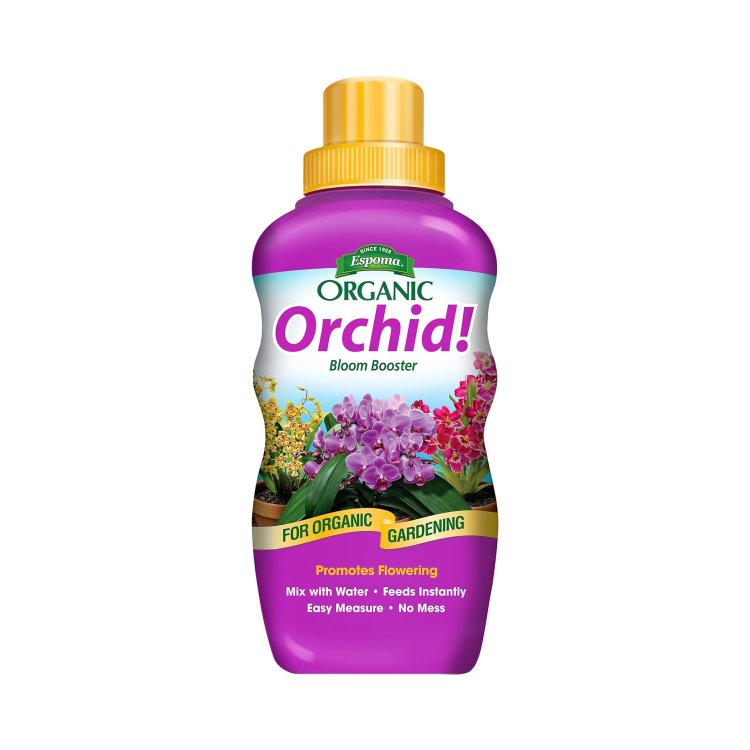How to fertilize orchids for healthy indoor plants – and the best feeds to use
Too much fertilizer can harm orchids, so make sure you know when and how much to give your plants

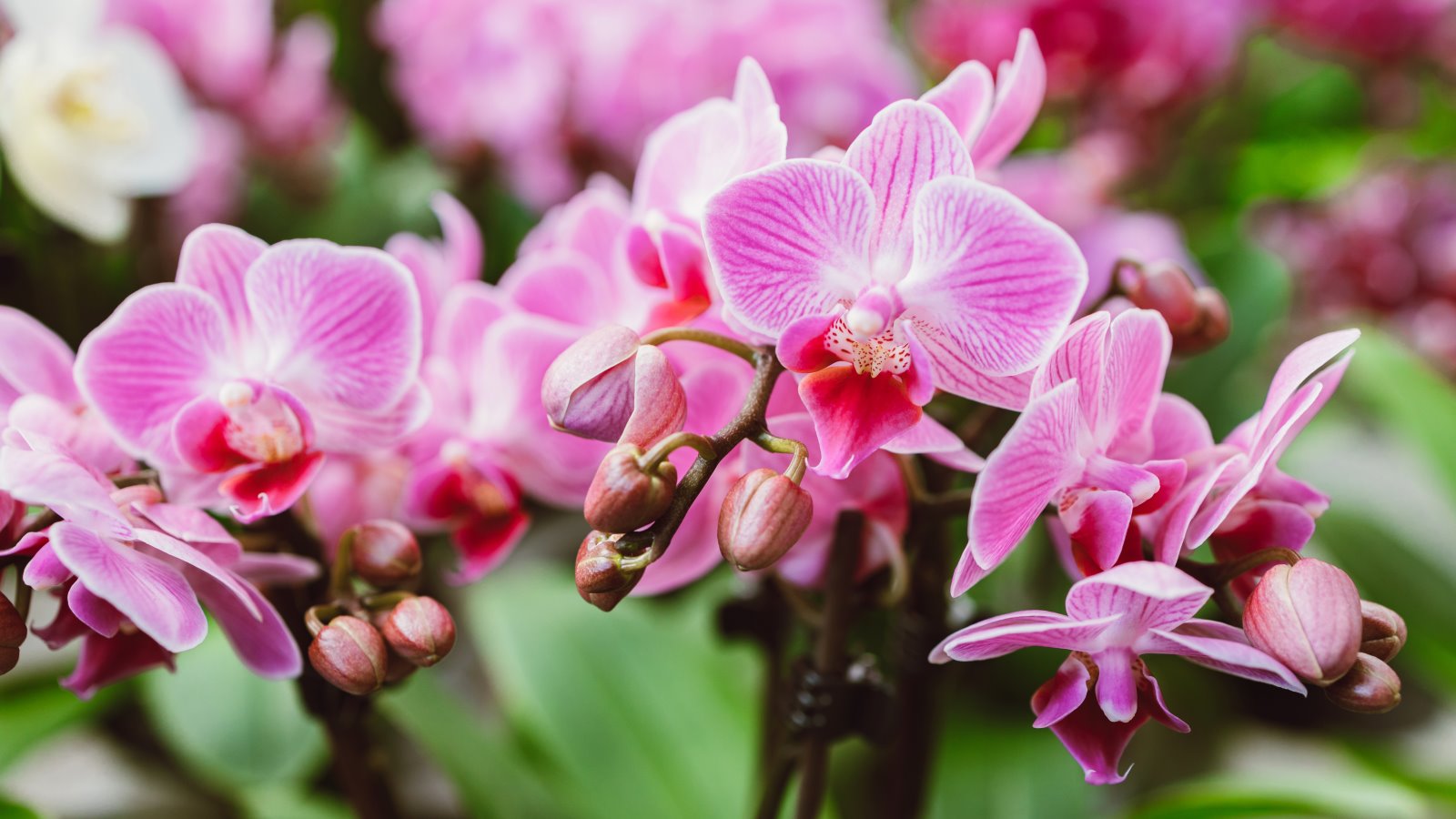
Design expertise in your inbox – from inspiring decorating ideas and beautiful celebrity homes to practical gardening advice and shopping round-ups.
You are now subscribed
Your newsletter sign-up was successful
Want to add more newsletters?

Twice a week
Homes&Gardens
The ultimate interior design resource from the world's leading experts - discover inspiring decorating ideas, color scheming know-how, garden inspiration and shopping expertise.

Once a week
In The Loop from Next In Design
Members of the Next in Design Circle will receive In the Loop, our weekly email filled with trade news, names to know and spotlight moments. Together we’re building a brighter design future.

Twice a week
Cucina
Whether you’re passionate about hosting exquisite dinners, experimenting with culinary trends, or perfecting your kitchen's design with timeless elegance and innovative functionality, this newsletter is here to inspire
Orchids are hugely popular houseplants that require careful maintenance when it comes to fertilizing. While these exotic plants can be undoubtedly stunning in the home, they do have very particular care requirements that have to be met.
Feeding orchids can be a fine art as the plants are very sensitive to too much fertilizer. It is therefore important to know the right time to feed orchids and the right amount of fertilizer to give them.
When it comes to orchid care, watering and fertilizing are two areas where things can seem tricky, and potentially daunting. Get it right, however, and plants will be healthy and give you the best blooms year-after-year.
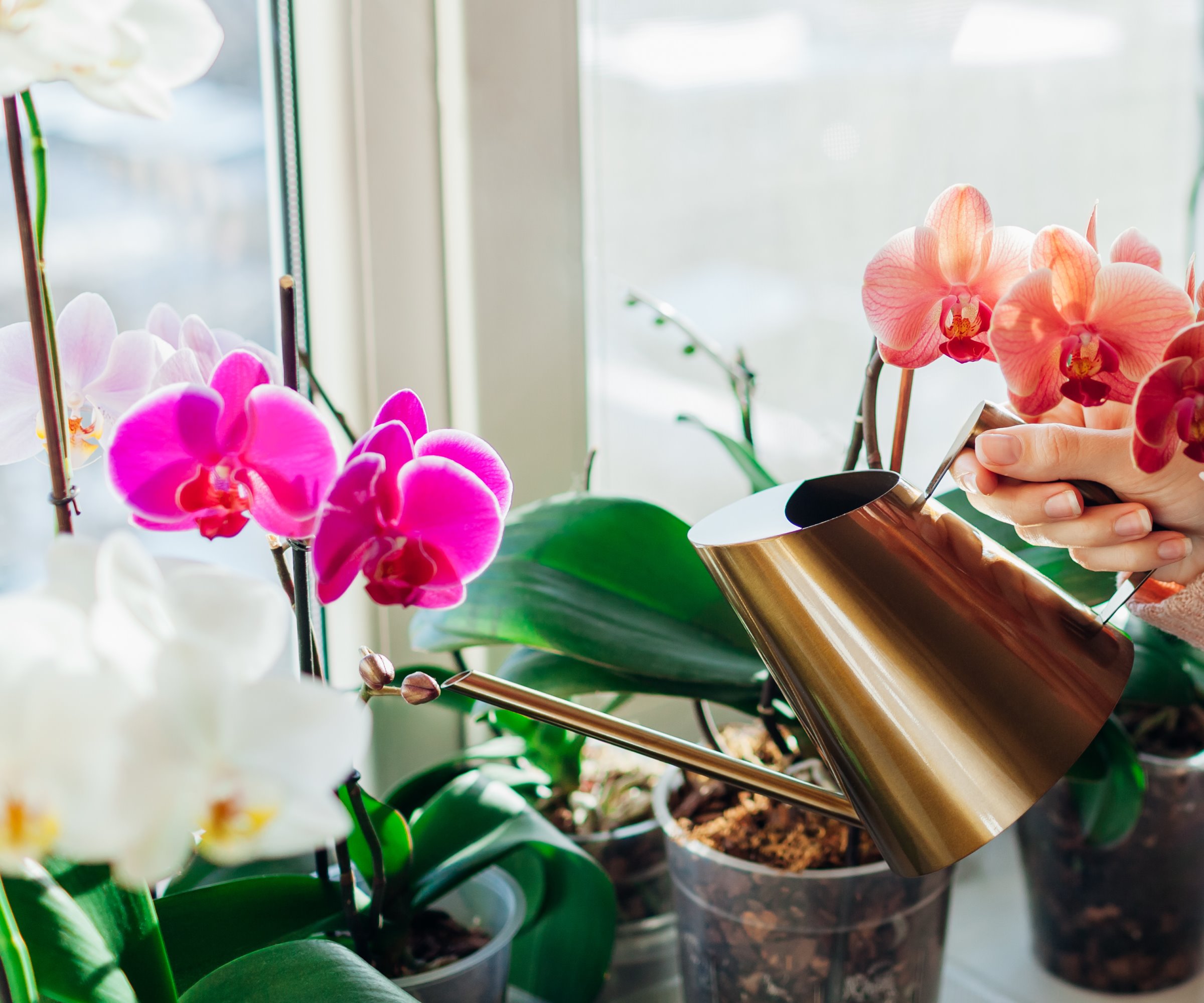
Watering and feeding orchids can be daunting to beginners
How to feed orchids
We hear from experts about when and how to fertilize orchids, along with the best feeds for these tropical indoor plants. You can even make your own orchid fertilizer. Along with knowing how to water orchids properly, following these key tips can help your orchids bloom for as long as possible.
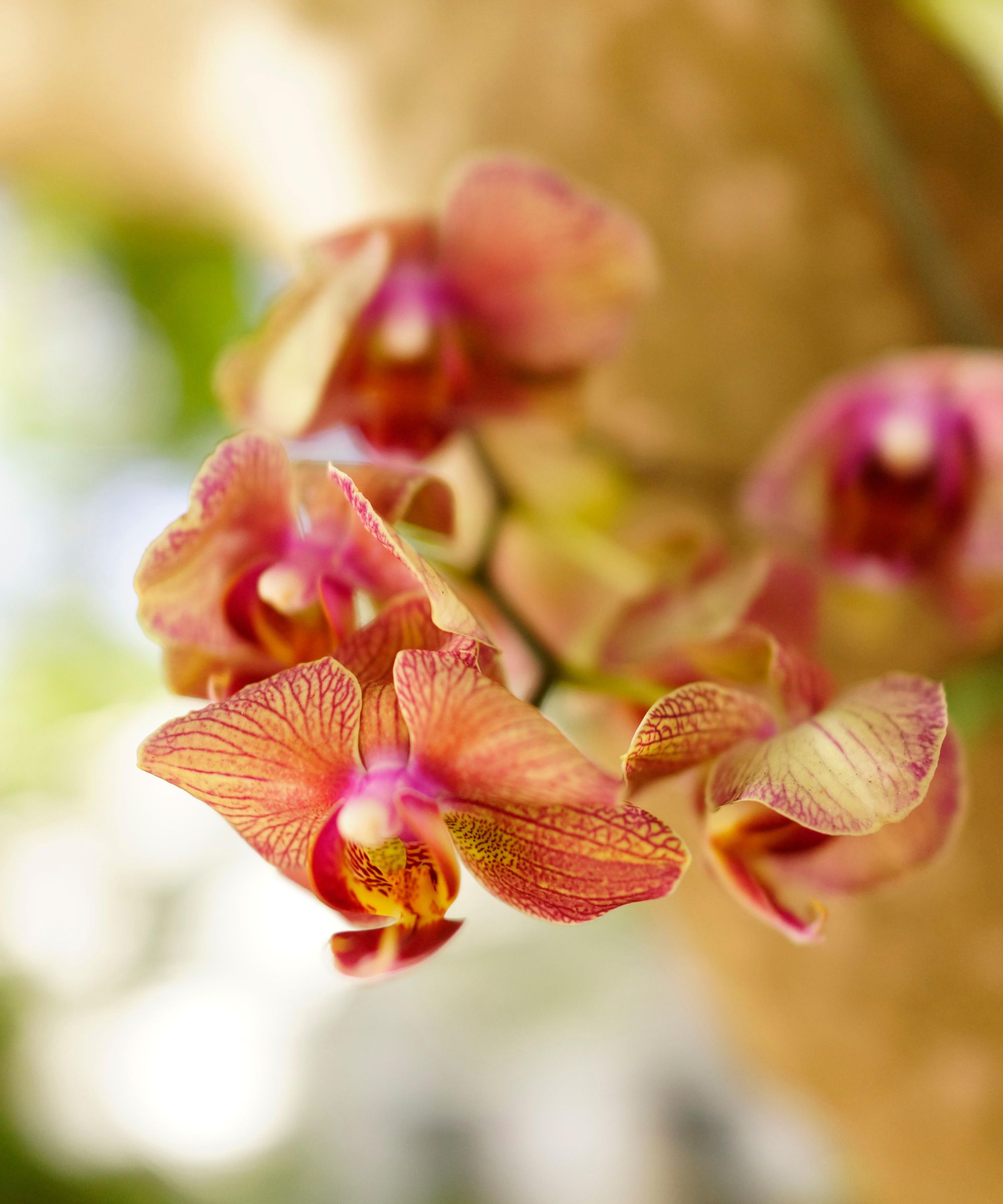
There is a wide variety of orchids to grow at home
How often to fertilize orchids
Orchids do need to be fed regularly to keep them healthy and happy, though it is important not to over-fertilize them. They are very sensitive to fertilizer and too much can burn the roots. When it comes to how often you need to feed these indoor flowering plants, the American Orchid Society recommends that orchids will ‘do far better with too little fertilizer than with too much’.
As well as not giving them too much, it is important to understand when to feed them and how much they need at each given point in their cycle. Orchids do definitely need to be fertilized during the peak growing periods, which come in spring and summer.
Stephen Webb, founder of Garden’s Whisper, says orchids need feeding at these times as it is when they actively require nutrients to support their development of leaves and roots.
Design expertise in your inbox – from inspiring decorating ideas and beautiful celebrity homes to practical gardening advice and shopping round-ups.
He adds: ‘A general guideline is to fertilize every 2-4 weeks during this period. However, during fall and winter - when orchids often enter a resting phase - it's advisable to reduce or halt fertilization to mimic their natural growth patterns.’
There are a lot of orchid growers who actually opt for a ‘weakly, weekly' approach to fertilizing orchids. In this scenario, they apply feed at a quarter-strength on a weekly approach, rather than a full dose monthly.
It is recommended that orchid plants are periodically flushed out with plain water to remove any excess accumulated salts from fertilizer that may have built up in the potting mix. Doing this around once a month can leach the salts away from the orchid’s roots.

Stephen Webb is a gardening enthusiast, with over 20 years of experience, and the founder and author of Garden’s Whisper. He uses his expertise and shares his wisdom to inspire gardeners through a series of books and articles.
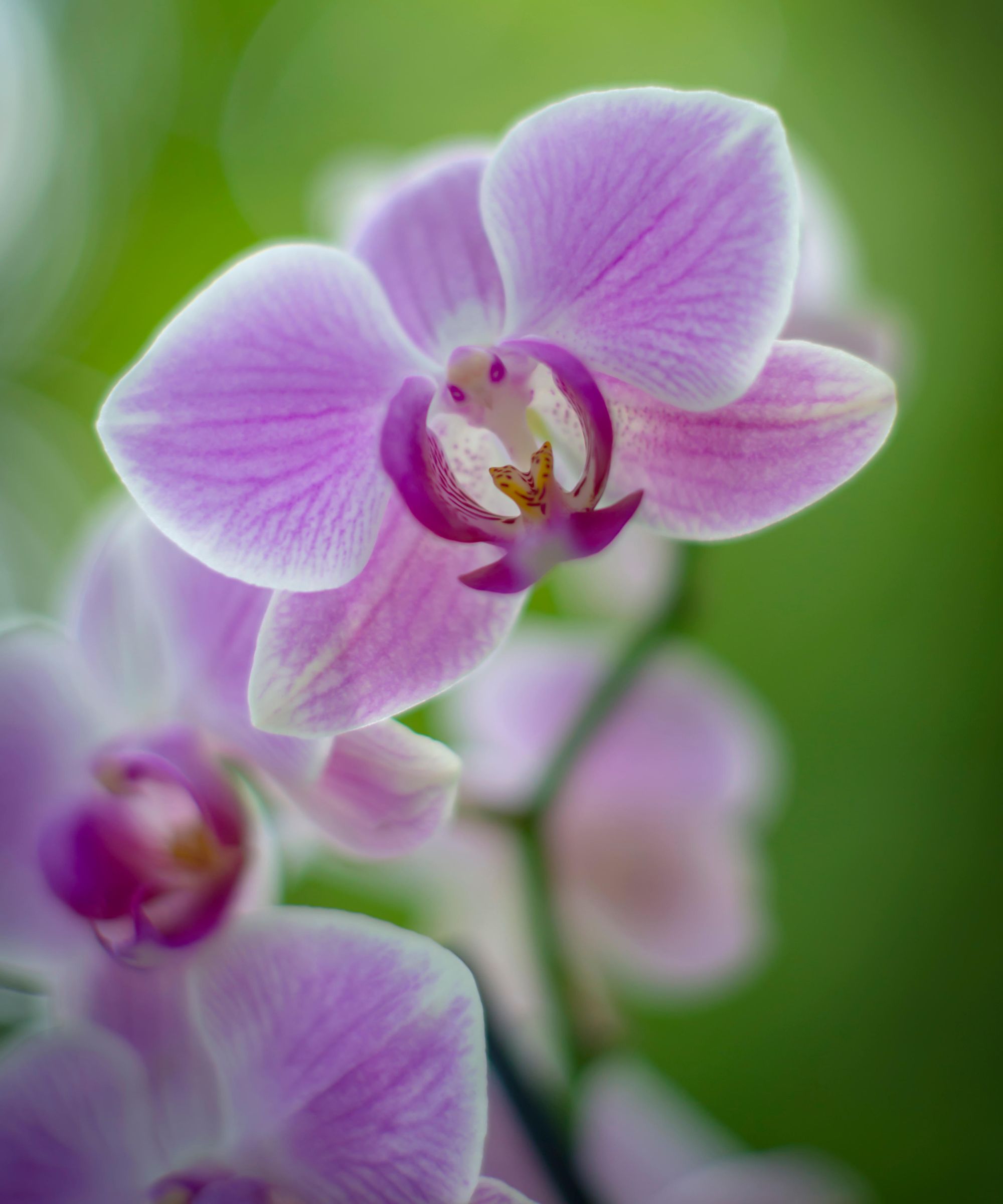
Orchid blooms are vivid and come in a plethora of colors
What is the best fertilizer for orchids?
After establishing a feeding routine for your plants, the next important aspect is to understand what fertilizer to use on orchids. You can buy specially-designed feed for orchids in garden centers or online, such orchid fertilizers are available at Amazon for example, and these water-soluble feeds or sprays are formulated for these delicate plants.
The best kind of fertilizer for orchids can depend on what medium your plants are growing in, as the material can impact what nutrients they require more of. The make-up of the nutrients of nitrogen, phosphorus and potassium, known as NPK, can be seen on any plant fertilizer label as a ratio, eg. balanced feeds will show 20-20-20 or 10-10-10.
Vladan Nikolic, Plant Expert at Mr Houseplant, explains how the growing media impacts on an orchid’s requirements. He says: ‘Orchids grown in bark require a fertilizer with a higher nitrogen ratio, such as 30-10-10 or 15-5-5 . Orchids that aren’t grown in bark and mounted orchids thrive with even formula fertilizer ratios, like 20-20-20.
Vladan adds: ‘Before and during the flowering phase, you can use a so-called bloom booster fertilizer, with a higher phosphorus ratio, such as 10-30-20. This will encourage blooming.’
Always make sure to follow the recommended rates on any fertilizer as adding too much can cause many problems for orchids, damaging the roots and harming the plant. For example, too much feed can be a reason why an orchid may be wilting.

Vladan Nikolic is a houseplant expert with over 10 years of experience. He is the founder of the houseplant care blog Mr. Houseplant and is a social media influencer for houseplants with over 500,000 followers.
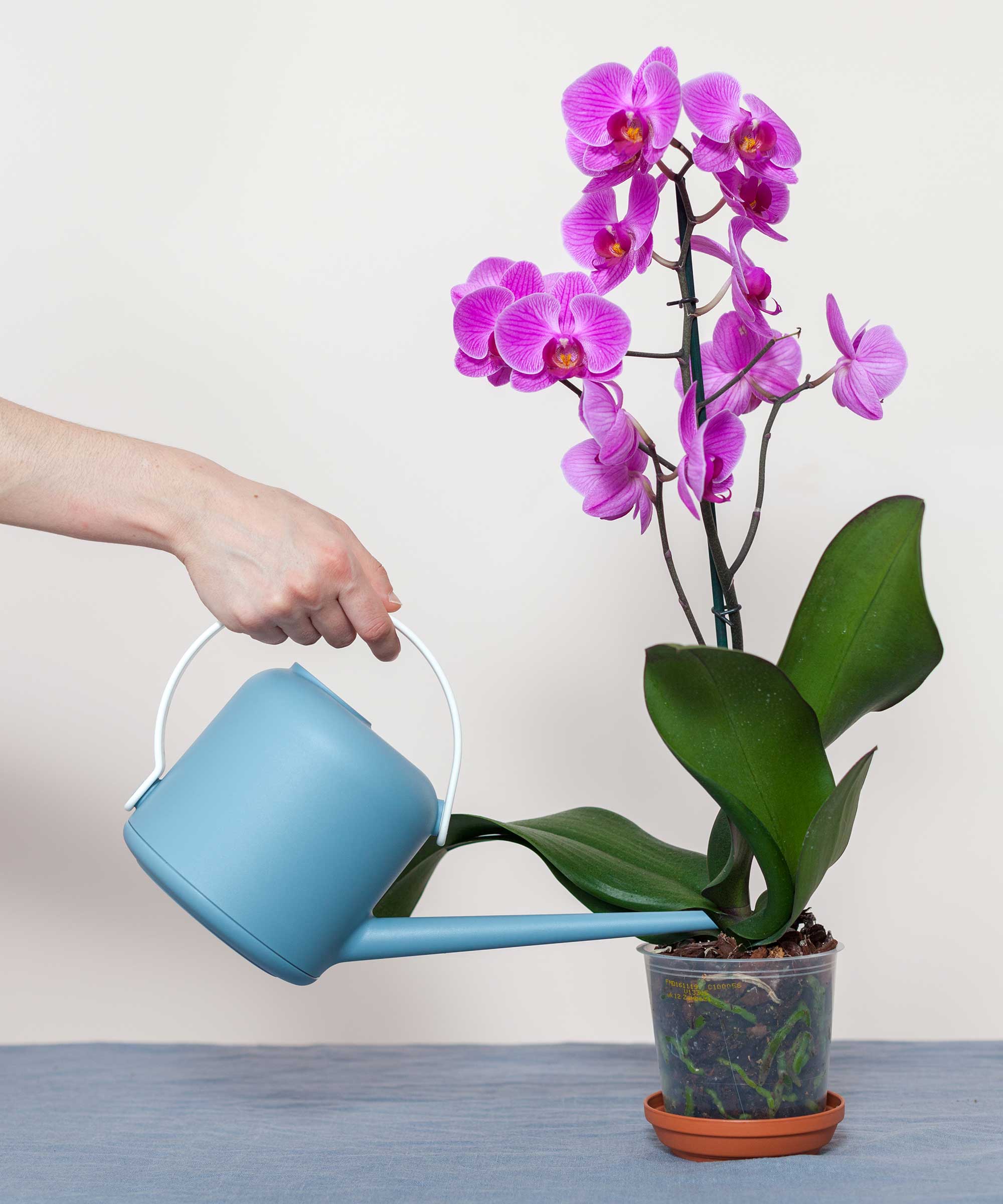
Many orchid fertilizers are water-soluble
When should you not fertilize orchids?
It is important to not fertilize orchids that are dry. When planning how often to water an orchid, try to time the watering to be just before feeding. Vladan Nikolic warns: ’Applying fertilizer to dry orchids can lead to root burn and stress. Always moisten the growing medium first.’
Many orchid growers do not feed their orchids after the plant enters dormancy during the winter months. The risk of overfeeding is heightened during the time of year when the plants are not growing. Any feeding in winter should always be done at a reduced rate.
FAQs
Can you use normal fertilizer for orchids?
It is always better to use feeds that are specially-formulated for orchids, however, it is possible to use a general purpose fertilizer with caution. Experienced gardener Anne Swithinbank recommends using a ‘quarter-strength general-purpose feed at every other watering’ in place of bespoke orchid fertilizer. If you do use a general fertilizer, it needs to be an all-purpose and balanced liquid feed, with an NPK ratio of 10-10-10 or 20-20-20.
Can I use Miracle Gro on orchids?
You can get Miracle Gro products that are designed for use on orchids. These include an orchid plant food mist, available at Amazon or from other retailers, as well as a formulated water soluble orchid food.
Along with watering and feeding, pruning orchids and repotting orchids are key parts of looking after these indoor plants. Orchids can become pot-bound over several years growing in one container, so should be repotted into a slightly larger pot when the plant shows signs of being too restrained in its current container.

Drew has worked as a writer since 2008 and was also a professional gardener for many years. As a trained horticulturist, he worked in prestigious historic gardens, including Hanbury Hall and the world-famous Hidcote Manor Garden. He also spent time as a specialist kitchen gardener at Soho Farmhouse and Netherby Hall, where he grew vegetables, fruit, herbs, and cut flowers for restaurants. Drew has written for numerous print and online publications and is an allotment holder and garden blogger. He is shortlisted for the Digital Gardening Writer of the Year at the 2025 Garden Media Guild Awards.
